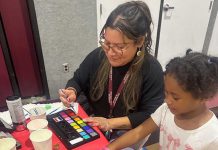
It’s important to have a place to go
Thirty years ago it was common practice to put mentally disabled
men and women into institutions where they were locked away from
the world and didn’t have interaction with anyone other than the
hospital staff and family.
It’s important to have a place to go
Thirty years ago it was common practice to put mentally disabled men and women into institutions where they were locked away from the world and didn’t have interaction with anyone other than the hospital staff and family.
Then, during the late 1970s, a program was created in Southern California by Ed and Marcia Dawson, which provided a structured setting outside of the home and allowed them to be with their peers and interact with their communities. They called the program Social Vocational Services.
The Hollister program was started in 2004, because Marcia Dawson had family in Hollister, said SVS Program Director Alyson Noble.
The facility opened that March with three staff members and four clients. Today they have 15 staff members and 33 clients. The clients range in age from 18 to 81 and have a range of disability levels from severe to minor.
The center serves clients from Hollister to Morgan Hill and provides free transportation.
The goal of SVS is to integrate clients into the community. Noble stressed that though vocational is in the title of the company, the focus of the program is not on productivity.
“We do things like go to the park, go the aquarium, go to the gym … We volunteer once per month at the Community Pantry. We have someone who comes in and does yoga. Some of our clients do academics. We have an Internet room. We also do janitorial work around the center. We learn life skills,” Noble said.
After the clients have been at SVS for a month, they meet with Noble, along with family members, if any, and a representative from the state to establish goals for each individual.
Some clients live at home where they might have specific tasks their families would like them to be able to accomplish; others live in group homes and are required to work to earn money.
“Some of the goals are academic, some are pre-vocational, and some are social — it varies depending on the client,” said Noble.
The clients are broken up into groups based upon their goals and the severity of their conditions.
Activities begin around 9 a.m. Monday through Friday and end at about 2 p.m.
“It’s the rough equivalent of a school day,” Noble said. “The people that come here work hard, but they also have a lot of fun.”
Community interaction is a key aspect of the program, where clients learn they have many of the same responsibilities as those in the broader community.
“It’s important for everyone to have a place they can go to socialize and be out and feel like they’re with people who genuinely care. That’s important,” Noble said. “When you’re not disabled the path is clear in terms of what you want to do, with disabled adults, that’s not so.”
SVS is not for everyone, said Noble. Some people come and find that the program doesn’t offer enough structure or discipline
“Community placement is not for everyone, but finding the right combination can be beneficial,” said Noble.
In addition to the day program that SVS operates, they also have a supplemental employment program supported through the Department of Rehabilitation. The program is for clients who don’t need the day program, but who might benefit from a job.
Sheena Muhn, 22, is the only SVS client enrolled in both programs. During the day she goes to the SVS day program and socializes with her friends, goes shopping, rides the bus, cleans and goes to the movies. She also works at Safeway as a service clerk.
“I love the program; it gets me out of the house and I like doing activities. We get to go all over, do all kinds of things,” Muhn said.
Joseph Rodriguez graduated from San Benito High School in 2006, so he hasn’t been coming to SVS very long, but he really likes it.
“I like coming here. All my friends are here. I like the computers and movies and drawing,” Rodriguez said.
Debi Mahler, mother of client Tony Mahler is thrilled for her son’s involvement with SVS.
“SVS is a wonderful program for clients like Tony. The only other program in town offers a very structured environment with few options … Social Vocational Services is exactly that, social. It’s a Godsend for our special kids,” Mahler said.
Tony is out in the community going to movies, taking walks, eating his sack lunch in the park or going to the coffee shop, she said.
“I know he’s well supervised with team leaders that care about him. And thank goodness, because I need all the help with Tony I can get. It’s nice to have a break, and Tony feels like he’s an important part of an important program,” Mahler said.
She added that the people at SVS aren’t counselors; they’re like extended family..
“It’s rewarding knowing I’m making a difference in someone else’s life, I’ve met a lot of good friends here,” said Veronica Martinez who has been working at SVS for two years.









